What is dangerous for man hornet
Content
- A bite of an insect
- First aid for hornet bite
- Hornet
Myths and Reality
There are many frightening myths about the very “dangerous” hornets:
- attacking for no reason;
- the bite is very painful;
- the hornet has 9 stings;
- the poison from seven bites is enough to kill a horse;
- three bites are enough to kill a man;
- poison is much stronger than the bee and affects the entire body.
Scary facts are enough to try to avoid the hornet and destroy his nest. But these points will have to be considered separately and in detail.
Attacks
Being a social insect that builds nests, the largest wasp, as the hornet is often called, considers protection of its home and its offspring a natural reaction to a threat. A person often does not notice the horned combs hidden in a secluded place and believes that the aggression was unreasonable. One has only to step back from the nest a couple of steps, as the attacks immediately cease. Even the reaction to the annoying smell will be only near the nesting place. Anywhere else, the hornet wasp will just fly away. Conclusion: the hornets had a reason for biting. When possible, representatives of this genus prefer to flee rather than attack. Wasp and Hornet - different insects, although there are similarities between them.
On a note!
If you give a hornet, it will sting too.
Bite soreness
The myth is based on the size of the insect: the larger, the harder the hornet stings. The statement is partly true. The pain of the bite of the European hornet on the Schmidt scale is on a par with the bite of a honey bee. The wasps Polistinae and Pepsis sting more painfully. But a bite asian hornet will be more painful due to the size of the insect. The hornet's sting corresponds to the size of an insect and penetrates deeper than a bee cannon. This circumstance adds thrills.
Number of stings
You can figure out how much the hornet stings you have on your own. It is enough to slam one and carefully consider. There is a myth that these types of wasps can sting repeatedly, because they have 9 stings. Where do they hide these stings?
On a note!
In fact, like all waspThe sting of a hornet is one. But it is smooth and does not stick in the skin of a person. So, this is a reusable weapon.
The degree of toxicity
Depends on the size of the insect. The larger the wasp, the more poison it can “single out” for one bite. The myth about killing a horse or a man is only partly true. But it's not so important how many times it stings. bee, wasp, hornet, bumblebee . It matters where they sting.
Important!
The general rule is: the closer to the brain was a bite, the more dangerous the situation.
Horses are more sensitive to insect poisons than humans, but it is impossible to kill them with seven doses to the femur or dorsal muscle. But if “lucky” to get poison into the jugular vein or into the oral cavity, the death of the animal is almost guaranteed. You can try to save a person.
First aid
The hornet venom causes an allergic reaction, one of the symptoms of which is soft tissue swelling. If the bite was made in the oral cavity, then swelling of the tongue or larynx is inevitable. Such swelling will block the airways and lead to suffocation. For a person in this case, you must immediately call an ambulance. If there is an antihistamine on hand in the ampoules and the syringe, you can prick the antidote. It is impossible to delay, even if "there is still nothing." The chances of life depend on how quickly a person enters the hospital with laryngeal edema.
With an animal in such a situation will have to go all-in. Provided that the bite occurred far from civilization.There is nothing left to lose here, but it is still possible to fix the matter if you force the animal to run as fast as possible. Purpose: to disperse the poison of the hornet throughout the body. Contrary to myths, no insect or reptile poison acts on the entire body. It is local and dangerous for small creatures whose “local action” extends to the whole body. Pets are usually much larger. Poison distributed in small doses throughout the body of the animal can do no harm. Spills blood poison, which must be made to flow as quickly as possible.
On a note!
A truly hornet is dangerous for its victims: smaller insects.
With a bite in a large vessel
This type of contact can be a serious danger to people. The hornet venom contains substances that destroy cell walls. The same substances are contained in the snake venom. This is an evolutionary adaptation that allows poisonous creatures to hunt and improves the absorption of food eaten. In the case of hornets, it facilitates the manufacture of a suspension for the larvae.
From first aid to a person in such a situation, only the fastest possible delivery to the hospital is possible, since the penetration of toxins into the brain will be instantaneous.And whether the dissolution of the blood vessel walls in the brain and the subsequent stroke, no one can say. It all depends on the dose and the individual characteristics of the body of the affected person.
Muscle lesions
In a large blood vessel still need to be able to get. In the case of insects, a person usually bites in the leg or hand. In this case, the poison enters the muscle. If you are allergic to animal poison, the scheme is standard: call an ambulance as soon as possible and send it to the hospital. The same applies to children with low body mass and insufficient muscle mass.
In the absence of allergy, the case is usually limited to a local allergic reaction:
- the bite swells and reddens;
- at first a person feels pain, later a strong itch;
- local tissue temperature is elevated.
If you get a few bites, the overall body temperature rises, vomiting may occur. There is sweat, dizziness. Symptoms of intoxication are observed.
Important!
You should not check on your own experience how many hornet bites a person can stand and stay alive. It is better that such knowledge remain theoretical.
In case of severe intoxication, the person should also be sent to the hospital as soon as possible. Before the arrival of the doctor, you can try to bring the temperature down by wiping a person with a wet cloth. You can not give aspirin, as this drug thins the blood, and the walls of blood vessels are already damaged by the poison of the hornet. Blood can seep through tissue through damaged walls.
In case of local irritation, the bite is washed with cold water and ice is applied. It will reduce pain and itching. After you need to consult a doctor and follow his recommendations.

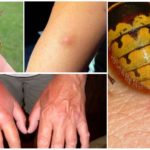
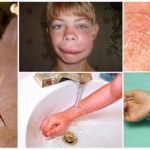
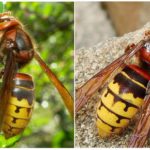
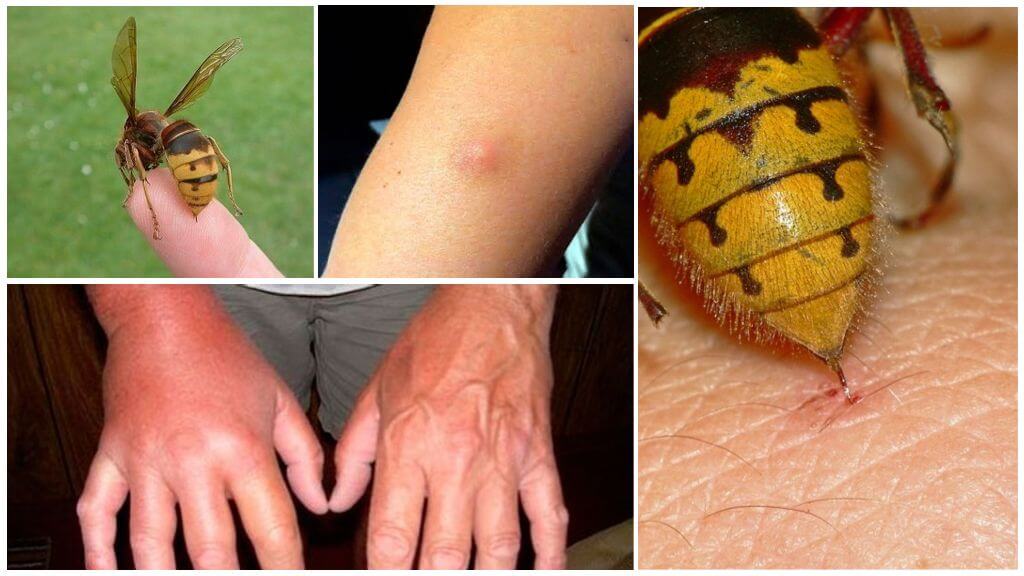
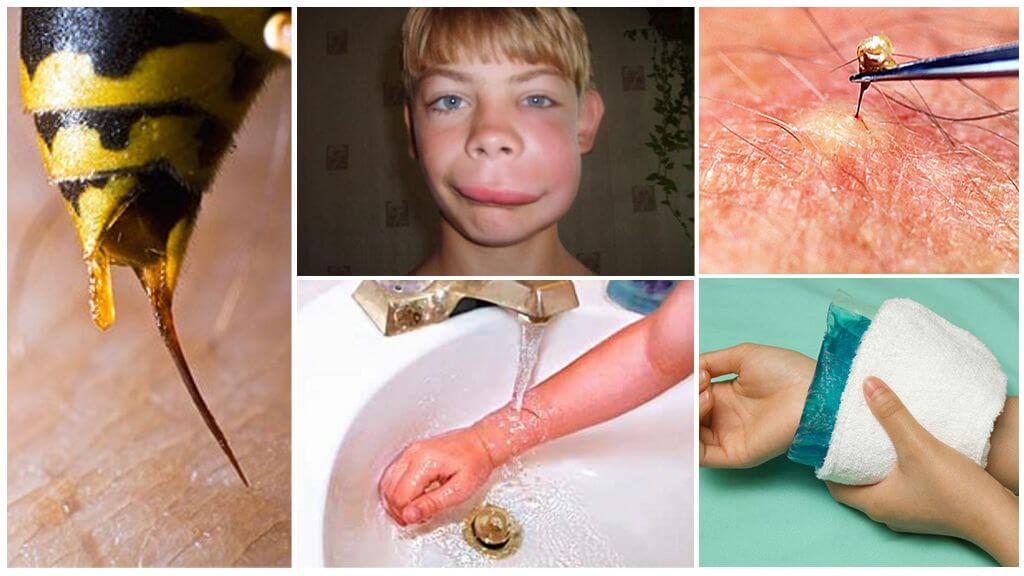
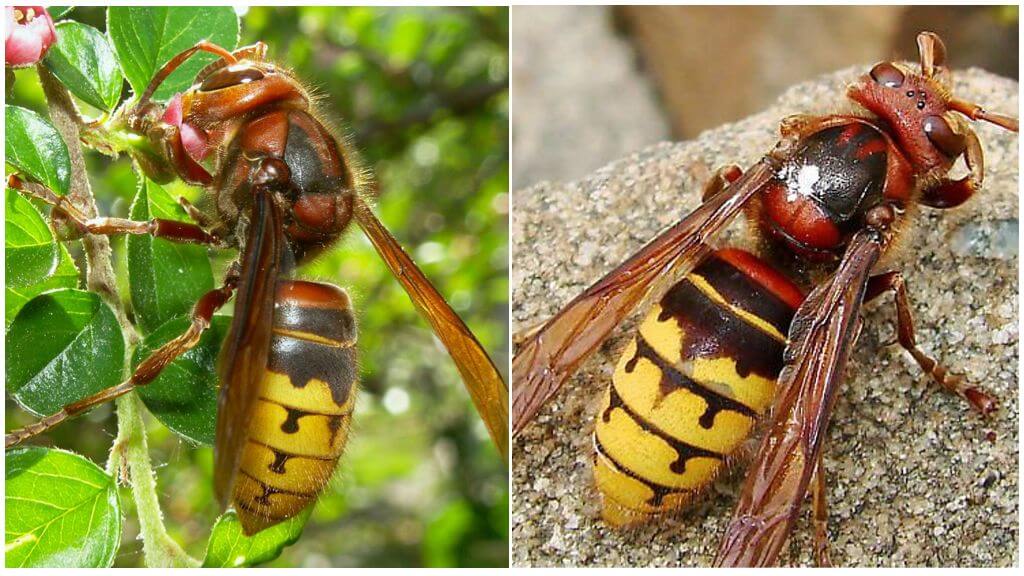

 (votes: 7, average rating: 4.71 out of 5)
(votes: 7, average rating: 4.71 out of 5)


